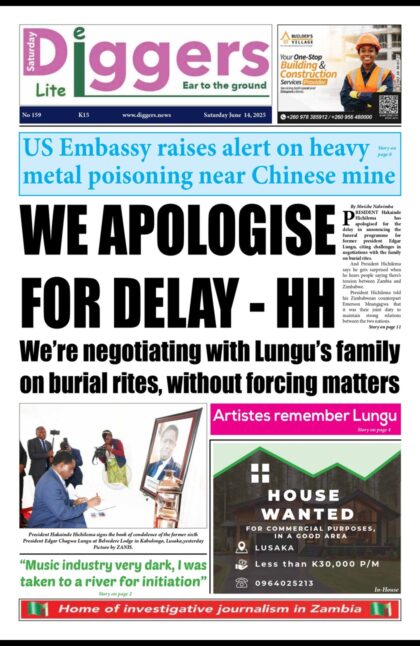CONSTITUTIONAL lawyer John Sangwa has argued that the Constitutional Court has the requisite jurisdiction to determine the matter in which he is challenging its decision to award costs in his petition against ECZ and others.
This is a matter in which Sangwa petitioned the ConCourt seeking an order to quash Section 30 of the Constitutional Court Act which provides that the said court shall have discretion to award costs in proceedings.
This was after the Attorney General and Lewis Mosho separately wrote to Sangwa demanding a total sum of K9,500,000 from him as costs following the ConCourt’s decision to dismiss his petition against ECZ and others.
However, in his answer, Attorney General Likando Kalaluka stated that the court had already pronounced itself on the issue of costs and it has no jurisdiction to hear and order for varying costs or re-hear the same.
He stated that he was of the belief that section 30 of the ConCourt Act No.8 of 2016 was not unconstitutional and allows the Court to award costs in deserving cases.
The Attorney General also raised a preliminary issue arguing that the Constitutional Court had no jurisdiction to determine the petition therefore it should be dismissed with costs.
But according to skeleton arguments in opposition to notice of motion to raise a preliminary issue, filed Friday, Sangwa submitted that the root of his opposition to the preliminary issue was that the ConCourt never determined the constitutionality of section 30 of the ConCourt Act in cause number 2021/ccz/0021 and secondly that the petition did not raise or seek the Court to determine substantive issues or facts that were raised and determined in the main matter.
He also argued that the doctrine of functus officio does not apply to this case as the petition seeks to preserve and protect the adjudicatory forum of governance and to uphold decorum and integrity in the scheme of justice delivery.
“We should also be quick to mention that the respondent’s reliance on article 128(4) of the Constitution which categorically prevents decisions of this court being appealable to the Supreme Court as the authority for this court being functus officio is flawed, as the petitioner has not appealed the decision of this court in cause no. 0021 to the Supreme Court. This matter has been originated by way of a petition before this court and not by way of appeal to the Supreme Court as envisaged under Article 128(4). We, therefore, find the reliance on article 128(4) of the Constitution by the respondent to be misplaced and therefore inapplicable in this matter,” Sangwa stated.
He further argued that the court cannot be said to be functus officio where a party raised issues that do not emanate from the substantive facts or issues raised and determined by a court and therefore submitted that the court does have the requisite jurisdiction to determine his petition.
Sangwa further prayed that the preliminary issue be dismissed as the petition was properly before court and should proceed to be heard and determined.
“We have demonstrated that the respondent’s preliminary issue is devoid of merit and should be dismissed by the court for reasons already advanced. We accordingly pray,” stated Sangwa.
In this petition, Sangwa is seeking a declaration that Section 30 of the Constitutional Court Act to the extent that it confers discretionary power in the Constitutional Court to award costs violates Articles 2, 52(4), 67(3), 101(4), 103(1), and 128(3) of the Constitution and therefore null and void.
He also wants a declaration that the award of costs by the Constitutional Court in a case in which he was seeking an amendment of the affidavit for presidential candidates, contravened Articles 2, 52(4), 67(3), 101(4), 103(1), and 128(3) of the Constitution and therefore the award of costs is null and void.
Sangwa who has cited the Attorney General as the respondent in the matter further wants an Order (of Certiorari) quashing Section 30 of the Constitutional Court Act and the award of costs in the said case.



















